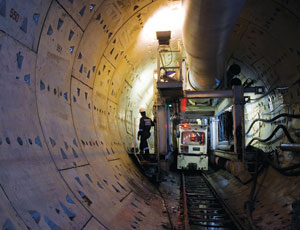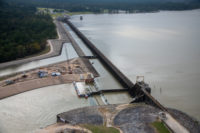Construction interests in Venezuela are watching with concern as the country struggles to recast its budget to handle new economic pressures brought on by a precipitous fall in the price of oil in the past year. More than 90% of Venezuela’s export revenue comes from oil. But petroleum prices have plummeted more than 50% in the past nine months, triggering a dramatic budget shortfall in South America’s leading oil-producing country. In a nationally televised announcement on March 21, Venezuela President Hugo Chavez unveiled a package of austerity measures and tax hikes to handle the growing economic pressures.

The nation’s original budget for 2009 was based on an annual estimated oil price of about $60 per barrel, but, as of March 31, the average price for the year was less than $37. The new budget is based on a $40-per-barrel price over the course of 2009, Chavez said in his address.
The Venezuelan leader promised to preserve a $100-million infrastructure initiative slated to run through 2013, as well as financing for existing projects. But the country’s scarcity of cash has already forced a cutback in payments to firms contracting with the government.
Petroleos de Venezuela SA, the country’s state-run oil company, owes $7.86 billion in back payments to oil service companies and suppliers, according to its most recent earning statements. Several of these companies have idled their operations as a result.
In the past several weeks, Venezuelan media have reported several government-funded construction efforts have been subject to work stoppages as well.
Officials with Odebrecht Venezuela, who are involved in several major infrastructure projects in the country, say they have no plans to curtail work on any of their jobs. The company is building a $991-million cable-stayed bridge over the Orinoco River as well as new subway lines in Caracas and Los Teque.
“We do not intend to slow down our efforts and if the customer makes any reduction of resources, we review the deadlines for completion,” says Jose Claudio Daltro, head of administration and finance for Odebrecht Venezuela, a unit of the Brazilian contractor. “We have had no problems with billing or reimbursements of work. We do not expect our works to be subject to nationalization.”
A more pressing problem for the government is finding the cash to pay the $10-billion-plus bill for recent nationalizations that have yet to be paid.
Over the past two years, Chavez has undertaken an aggressive nationalization campaign that has included takeovers of energy, telecommunication, steel and cement companies. Few have been compensated for the loss of their assets. Cement manufacturers have begun turning to legal means to recoup their losses.
In April of last year, Chavez nationalized the country’s cement industry. Citing the country’s housing shortage, he claimed the sector was of strategic importance. Two cement makers, Mexico’s Cemex and Switzerland’s Holcim, turned to the World Bank to recoup their losses.
Cemex, which held almost half of Venezuela’s cement market, had its business seized after Venezuela balked at paying $1.3 billion the company demanded as payment for its holdings. Cemex officials filed an arbitration claim with the World Bank in December. Holcim agreed to a $552-million offer for its operations but turned to arbitration this month after Venezuela cut off payment talks. France’s Lafarge is also still owed $267 million as well.



Post a comment to this article
Report Abusive Comment